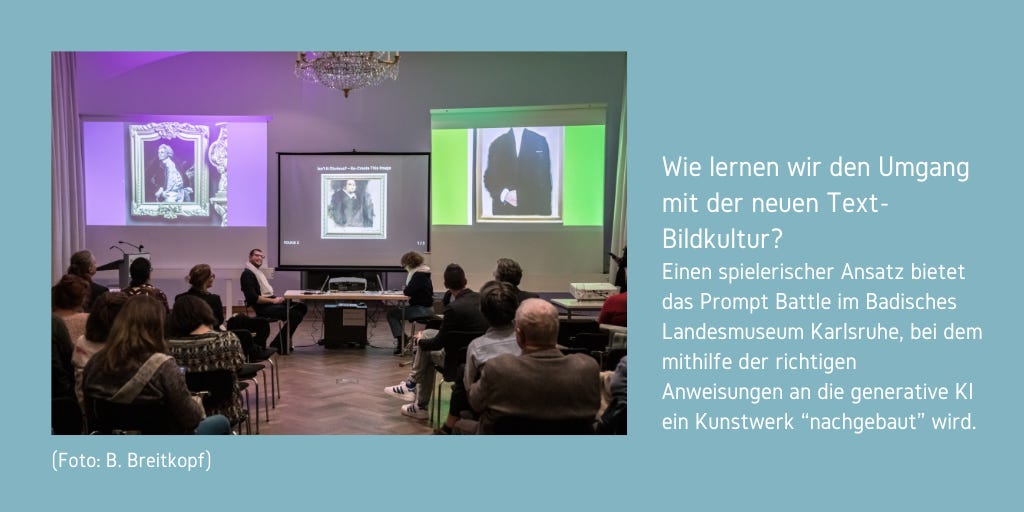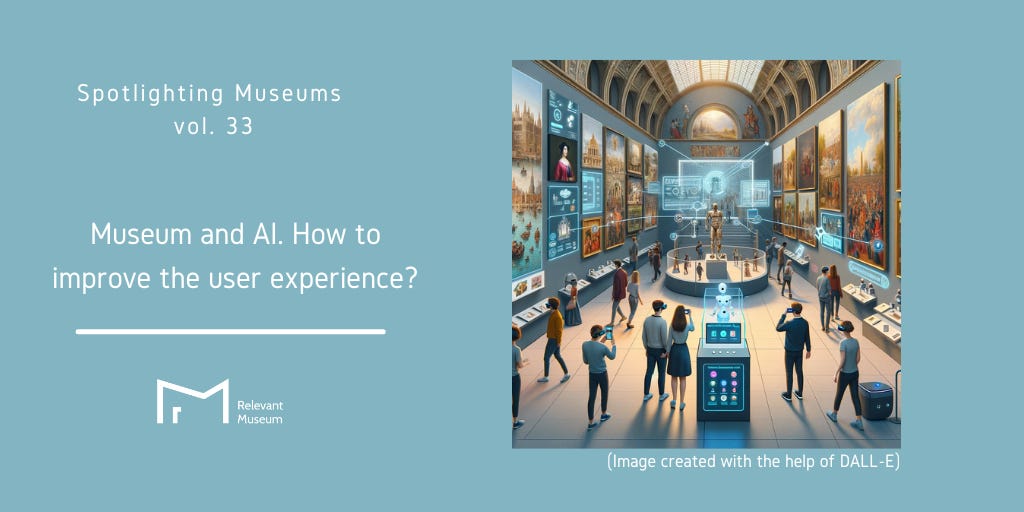Spotlighting Museums vol. 33
Museum und KI. Wie lässt sich die User Experience verbessern? - Museum and AI. How to improve the User Experience?
Please find the English Version below
Happy New Year! Wir hoffen, Sie sind erholt und motiviert in 2024 gestartet und freuen uns, dass wir Sie weiter begleiten dürfen. Zum Jahresauftakt beschäftigen wir uns mit einem Thema, das allgegenwärtig ist, aber in den Museumsalltag nur langsam Einzug nimmt: Künstliche Intelligenz.
Dafür haben wir Sonja Thiel eingeladen, uns mit ihrer Expertise zu KI und Museumsarbeit einen Einblick in die aktuellen Entwicklungen, Chancen und Hausforderungen für die museale Arbeit zu geben. Sonja hat zwischen 2021 und 2023 am Badischen Landesmuseum das Pilotprojekt „Creative User Empowerment“ geleitet. Erkenntnisse aus dieser Zeit teilt sie mit uns in ihrem Beitrag.
2023 scheint das Jahr der Künstlichen Intelligenz gewesen zu sein. Mit der Veröffentlichung von ChatGPT und dem rasanten Ansteigen der Nutzerzahlen des Modells ist ein neues Phänomen in der Breite der Gesellschaft angekommen: Generative KI-Technologien. Wir können zum gegenwärtigen Zeitpunkt die Folgen der Technologie noch schwer abschätzen, klar ist nur: Es verändert unsere Kultur, wie wir arbeiten, kommunizieren und produzieren.
Die Diskussion über die zugrundeliegenden „Foundation Models“, damit zusammenhängende Urheberrechtsverletzungen und neue Vergütungsmodelle für Künstler:innen und Autor:innen, faire und qualitative Datengrundlagen für KI-Training und vor allem eine noch schwer einzuschätzende neue Bild- und Textkultur stellt auch Museen und Kultureinrichtungen vor neue Chancen und Herausforderungen.
Mit dem Aufkommen von neuen generativen Technologien stellen sich Fragen von Mehrwerten für Sammlung, Erschließung und Vermittlung, nicht zuletzt, da sich die Grenzen zwischen menschlicher und maschineller Produktion verschieben. Handelt es sich bei Künstlicher Intelligenz schlicht um ein Werkzeug oder doch auch um eine neue Kulturform, die Einzug hält in unsere Lebens- und Arbeitsbereiche?
Mit dem AI Act der EU werden 2024 Regelungen verabschiedet, die einerseits eine breite Definition von Künstlicher Intelligenz einräumen und andererseits eine strikte Form der risikobasierten Technologieregulierung vorbereiten. Was haben Kulturschaffende oder Museen damit zu tun? Neben der drängenden Frage, wie Foundation Modelle schon jetzt unsere Wissenskultur, Kunst- und Kulturproduktion und vor allem auch Medien und demokratische Prozesse beeinflussen, können wir aktuell vor allem beobachten, analysieren, lernen, gestalten oder entwickeln: Denn welche Unterstützung wünschen wir uns eigentlich und wie kreativ und offen sind wir im Umgang mit Transformation?
Für Besucherorientierung gibt es gute Nachrichten: Über Motivsuchen können Bilder und Kunstwerke nun anhand einer vagen Beschreibung gefunden werden. Suchanfragen wie „Bilder vom Künstler, der den Schrei gemalt hat“ oder „Motive von Winterlandschaften und Eisbergen“ stellen kein Problem mehr für digitale Kurator:innen dar. Alt-Texte, Bildbeschreibungen und Übersetzungen können automatisch erstellt werden und so Barrierefreiheit unterstützt werden. Anreicherungen und Verknüpfungen können im Hintergrund die Erfahrungen für Besucher:innen unterstützen – wenn die Verbindung zwischen Backend und Frontend oder Sammlung und Vermittlung klappt. Such- und Auffindbarkeit erhalten mit und ohne Normdaten ein neues Level, das ermöglicht, sich auf das zu konzentrieren, was wirklich wichtig ist: Motive, Inhalte, Kontexte oder Emotionen. Interessensgestützte Empfehlungen, individuelle Touren oder immersive Avatarerzählungen sind keine große Hürde mehr. Durch die Integration von Chatbots können Basisinformationen und Buchungsvorgänge unterstützt werden. Über Potentiale für Marketing und Zielgruppenanalyse wurde auch bereits in Schleswig-Holstein geforscht.
Im Rahmen des Netzwerks KI und Museen – ursprünglich entstanden im englischsprachigen Raum und in den deutschsprachigen Raum transferiert und erweitert – wurden in den vergangenen Jahren verschiedene Sharing & Learning Workshops, Talks sowie eine Tagung durchgeführt und Erkenntnisse in einem Toolkit und der Publikation „AI In Museums“ veröffentlicht. Der Sammelband gibt einen Überblick über verschiedene Konzepte, die Künstlicher (maschineller) Intelligenz zugeschrieben werden und zeigt einige – keineswegs abschließende – Ansätze auf, wie KI auch kulturwissenschaftlich und philosophisch verstanden werden kann. Außerdem geht die Publikation auf die Ursprünge von KI-Kunst ein und gibt einen Überblick über Projekte aus der digitalen Erschließung und Vermittlung der vergangenen Jahre. Der Band will damit eine Anregung geben, die Mehrwerte und Möglichkeiten von maschinellem Lernen besser zu verstehen und Austausch anstoßen, wie KI nicht nur vermittelt sondern auch in der Museumspraxis angewendet und entwickelt werden kann. Weil das gar nicht so einfach ist, wurde im Projekt „Creative User Empowerment“ ein Datalab eingerichtet und damit ein temporärer digitaler Experimentierraum geschaffen, in dem z.B. mit Nutzer:innen, Kurator:innen und Fokusgruppen getestet werden konnte, ob und wie ein Sprachmodell gewinnbringend eingesetzt werden kann. Kann es auf Basis der Sammlung auch Anregung für Marketing und Vermittlung oder tatsächlich inhaltlich sinnvolle Unterstützung für Such- und Erschließungsprozesse bieten? Wir glauben: ja, aber nur wenn Menschen kompetent und informiert in der Lage sind, Prozesse und Ergebnisse zu beurteilen und bereit sind, offen und neugierig zu forschen und zu entwickeln.
Vielen Dank für Ihr Interesse an unserer aktuellen Ausgabe.
Wer sich professionell mit dem Netzwerk verbinden will, kann in der LinkedIn Gruppe „Künstliche Intelligenz und Kultur“ spannende Leute finden, die sich mit dem Themenfeld befassen.
Wenn Sie sich insgesamt für die aktuellen Entwicklungen rund um Digitalität im Museum interessieren, empfehlen wir Ihnen die hybride Tagung „Gemeinsam Digital - Die Arbeitstagung für kleine und mittlere Museen“ vom 19. bis 21. Februar. Organisiert wird das fachliche Zusammentreffen von der Medien- und Filmgesellschaft Baden-Württemberg. Sie haben die Möglichkeit, vor Ort in Stuttgart oder digital an den Vorträgen und Workshops teilzunehmen.
Weitere spannende Termine:
Der DigAMus Award 2024 geht in die nächste Runde und wird wieder wegweisende digitale Projekte feiern (ab Februar)
No risk, no innovation? Künstliche Intelligenz in der Museumspraxis, Tagung der HTW Berlin, am 26. April 2024 in Berlin
MAI-Tagung (Museum and the Internet) vom 16.-17. Mai 2024 in Berlin
Herzliche Grüße
Sandra Richter, NORDMETALL-Stiftung
Happy New Year! We hope you have started 2024 refreshed and motivated and look forward to continuing to accompany you. To kick off the new year, we are focussing on a topic that is omnipresent but is only slowly making its way into everyday museum life: Artificial Intelligence.
We have invited Sonja Thiel to share her expertise on AI and museum work and give us an insight into current developments, opportunities and challenges for museum work. Sonja led the "Creative User Empowerment" pilot project at the Badisches Landesmuseum between 2021 and 2023. She shares insights from this time with us in her article.
2023 appears to have been the year of artificial intelligence. With the publication of ChatGPT and the rapid increase in the number of users of the model, a new phenomenon has arrived in society: generative AI technologies. At the moment, it is still difficult to estimate the consequences of the technology, but one thing is clear: it is changing our culture, how we work, communicate and create.
The discussion about the underlying "foundation models", related copyright infringements and new compensation models for artists and authors, fair and qualitative data bases for AI training and, above all, a new image and text culture that is still difficult to assess also presents museums and cultural institutions with new opportunities and challenges.
The emergence of new generative technologies raises questions of added value for collection, cataloguing and education, not least because the boundaries between human and machine production are shifting. Is artificial intelligence simply a tool or is it also a new cultural form that is finding its way into our areas of life and work?
With the EU's AI Act, regulations will be passed in 2024 that will allow for a broad definition of artificial intelligence on the one hand and prepare for a strict form of risk-based technology regulation on the other. What do cultural professionals or museums have to do with this? In addition to the compelling question of how foundation models are already influencing our knowledge culture, art and cultural production and, above all, media and democratic processes, we can currently primarily observe, analyse, learn, design or develop: After all, what kind of support do we actually want and how creative and open are we in dealing with transformation?
There is some good news for audience developement: Images and artworks can now be found using a vague description. Search queries such as "pictures by the artist who painted the scream" or "motifs of winter landscapes and ice mountains" are no longer a problem for digital curators. Alt texts, image descriptions and translations can be created automatically to support accessibility. Enrichments and links can support the visitor experience in the background - if the connection between backend and frontend or collection and education works. Search and findability are taken to a new level with and without standardised data, allowing us to focus on what is really important: motifs, content, contexts or emotions. Interest-based recommendations, customised tours or immersive avatar narratives are no longer a major hurdle. The integration of chatbots can support basic information and booking processes. Research into the potential for marketing and target group analyses has already been carried out in Schleswig-Holstein.
As part of the AI and Museums network – originally created in English-speaking countries and transferred and expanded to German-speaking countries – various Sharing & Learning workshops, talks and a conference have been held over the past few years and findings have been published in a toolkit and the publication "AI In Museums". The publication provides an overview of various concepts that are attributed to artificial intelligence and shows some approaches to how AI can also be understood in terms of cultural studies and philosophy. The publication also looks at the origins of AI art and provides an overview of digital cataloguing and education projects from recent years. The aim of the publication is to encourage a better understanding of the added value and possibilities of machine learning and to initiate dialogue on how AI can not only be communicated but also applied and developed in museum practice. Because this is not so easy, a datalab was set up in the "Creative User Empowerment" project, creating a temporary digital experimentation space in which, for example, users, curators and focus groups could test whether and how a language model can be used profitably. Based on the collection, can it also provide inspiration for marketing and communication or actually offer meaningful support in terms of content for search and development processes? We believe: yes, but only if people are competent and informed, able to judge processes and results and are prepared to research and develop with an open mind and curiosity.
Thank you for your interest in our current issue.
If you want to connect professionally with the network, you can find exciting people who deal with this topic in the LinkedIn group "Artificial Intelligence and Culture".
If you are generally interested in the latest digital developments in museums, we recommend the hybrid conference "Digital together - The workshop for small and medium-sized museums" from 19 to 21 February. The professional meeting is organised by the Medien- und Filmgesellschaft Baden-Württemberg. You have the opportunity to take part in the lectures and workshops on site in Stuttgart or online.
More upcoming dates that my interest you:
The DigAMus Award 2024 enters the next round and will once again celebrate pioneering digital projects (starting in February)
No risk, no innovation? Artificial intelligence in museum practice, conference of the HTW Berlin, on 26 April 2024 in Berlin
MAI conference (Museum and the Internet) from 16-17 May 2024 in Berlin










